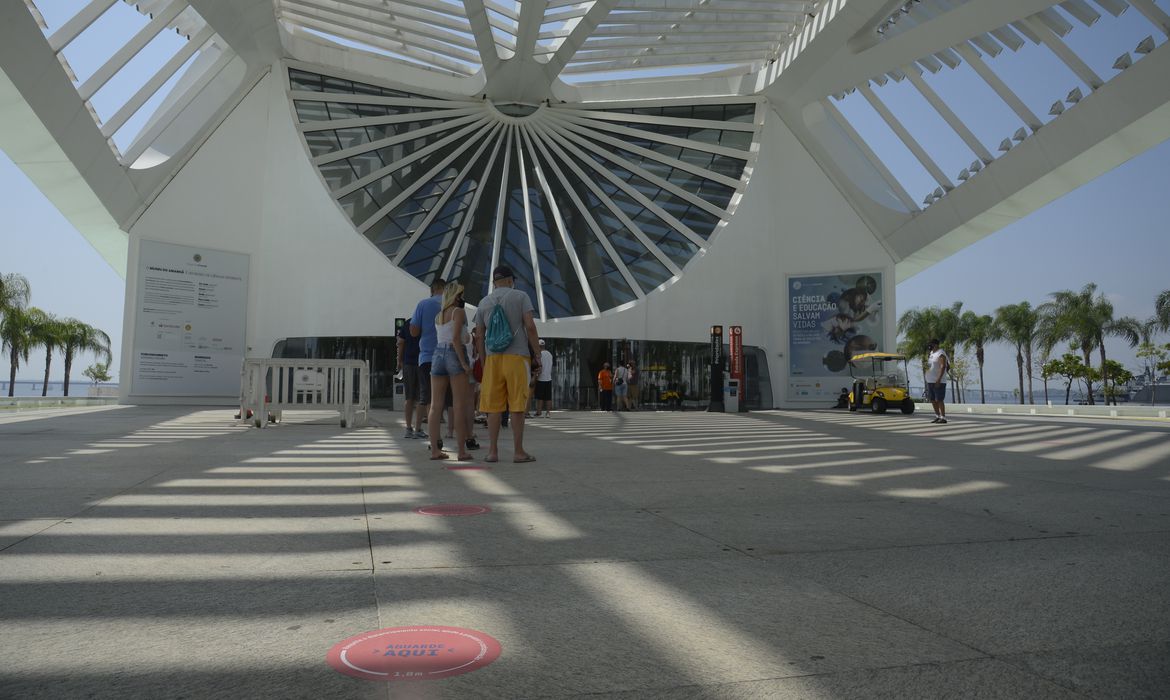RIO DE JANEIRO, BRAZIL – From today (15), the Museum of Tomorrow in Rio de Janeiro will again have free admission on Tuesdays. Tickets must be taken through the Eventim platform, where the day and time of the visit must be specified.
“When we receive a visitor who has not yet done so, our service team helps make the booking through the cell phone. We have a base here where this can be done,” said Maria Garibaldi, the museum’s executive director.
Upon entry, visitors must present the voucher, either printed or via cell phone. “We understand that there was a big public appeal to resume free admission, and starting tomorrow, March 15, the museum will resume free admission on Tuesdays,” the director said.

2022 SCHEDULE
This year, the Museum of Tomorrow’s program includes science, education, environment, health, and democracy projects. The theme for 2022 is “About Experience: The Life We Want.”
The program aims to integrate different sources of knowledge, such as the exhibitions Fruturos – Tempos Amazônicos, which opened last December 17 and runs through June, and that of photographer Sebastião Salgado, which opens July 19. Both are focused on the macro theme of regeneration.
Sebastião Salgado’s exhibition Amazonia, which has already been seen in Paris, Rome, and London and is now in São Paulo, shows the result of seven years of experiences and photographic expeditions through the Brazilian Amazon and also features the people of 12 indigenous communities in the region.
Starting in April, Amanhãs do Brasil will be part of the program, which focuses on democracy and freedoms and includes important discussions for the country’s future, including education, climate justice, quality information, and culture.
Experts will discuss important issues related to democracy in five face-to-face meetings open to the public. Confirmed guests include indigenous leader Txai Suruí, scientist Nina da Hora, journalist Marcos Luca Valentim, biomedical scientist Helena Nader and lawyer Cláudio Lins de Vasconcelos.
A debate on heart health will also be held concurrently with the World Congress of Cardiology, held Oct. 13-15 in Rio de Janeiro, along with the 77th Brazilian Congress of Cardiology.
The Heart and Longevity exhibition, supported by the Brazilian Society of Cardiology, will address issues related to cardiovascular health and the relationship between increasing life expectancy and a multidisciplinary view of the organ. The exhibition will occupy all of the museum’s spaces unprecedentedly.
The heart will be viewed as a guardian of emotion. The public will learn how it is portrayed in art history, the anatomy of the heart, health, and society, innovations in heart health treatment, and the connection of longevity to the highest quality of life.
“They [the themes] also speak volumes about how we can take care of our bodies and be aware of environmental factors in the places we live and the impact they have on our longevity, heart health, levels of pollution and issues related to nutrition,” said Leonardo Menezes, director of knowledge and creation and curator of the museum.
During Environment Week, June 5-11, there will be a series of panel discussions, lectures, roundtables, and documentary screenings on planetary conservation, climate change, ocean protection, Guanabara Bay, sustainable cities, forest regeneration, and sustainable facilities.
In December, it will be the turn of the cast of the Anthropocene. The project will bring together scientists, artists, environmentalists, managers, agents, governments, institutions, and society to think, experience, collaborate, and act to protect our planet’s present and future.
The goal is to present thinking and action about human impact on the Earth and the urgency of achieving balance for the Earth.
PROJECTS
In 2022, the museum will continue projects such as Inspira Ciência, a continuing education program for elementary school teachers that addresses fundamental topics in astronomy, geology, biology, and ecology. According to the director, Inspira Ciência helps educators who want to update their knowledge and responds to the requirements arising from national curricula.
Another project that will continue this year is Women in Science, which targets Brazilian women researchers in science, technology, engineering, and mathematics. The goal is to strengthen female leaders in science and technology-based innovation.
With information from Agencia Brasil

